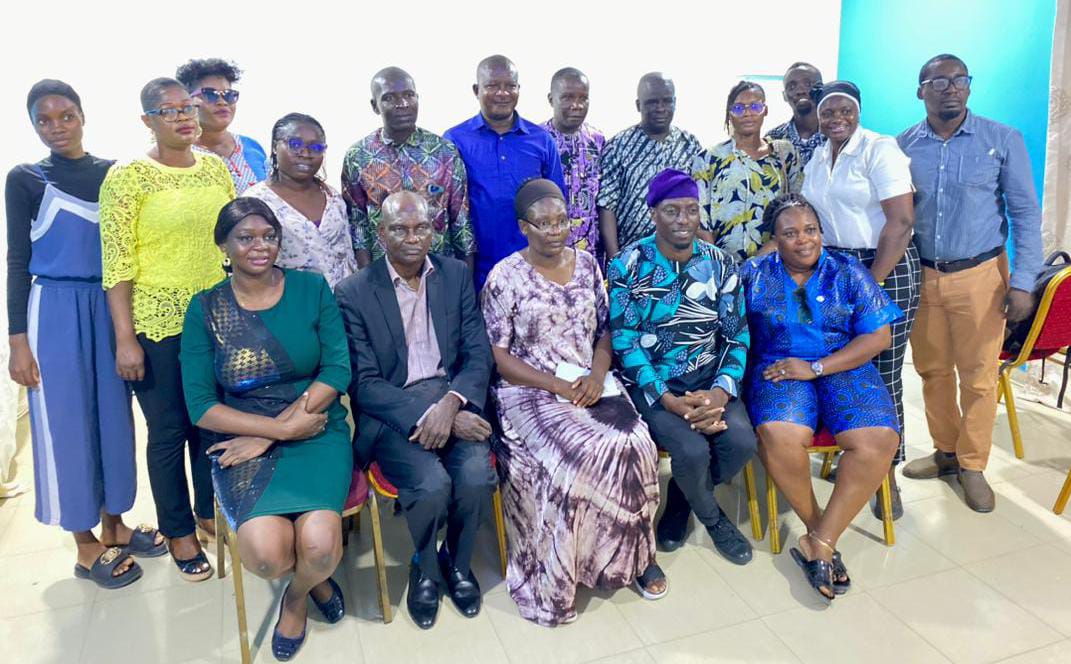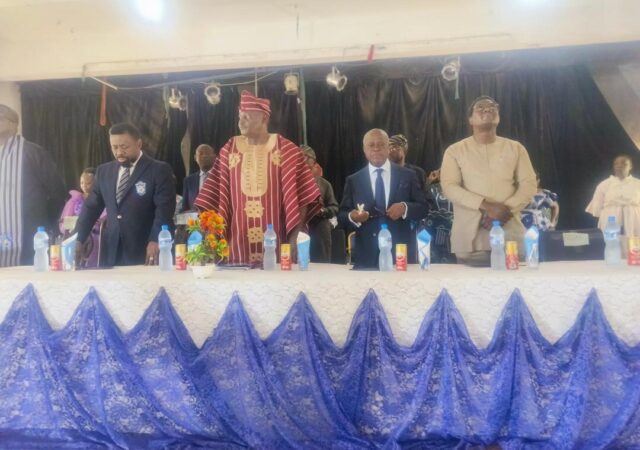- Render Account of Participation
- Seek Effective Climate Action Responses
A Coalition of Nigerian Civil Society Organizations are strongly advocating for the prompt and active implementation of agreements reached at the just concluded 28th Session of Conferenc of Parties, which held in Dubai, UAE.
Rendering an account of their participation at COP28, the coalition have also lamented the inadequacy of financial pledges made across various negotiation streams, stating they were insufficient to effectively respond to climate change needs. The coalition are therefore calling on developed country parties to increase their financial commitments and promptly fulfill their pledges to accelerate climate action on the ground.
Calling on the Nigerian Government and all other participating organizations, including the private sector and other CSO organizations, the coalition made this appeal at a press briefing held in Lagos, yesterday.
The coalition, made up of the Centre for 21st Century Issues, Society for Planet and Prosperity (SPP) and Environews Development Network (Endenet), disclsoed that with support from the Foreign, Commonwealth and Development Office (FCDO) of the British High Commision (BHC), they mobilised over 250 civil society organizations to COP28, integrated with the media and subsequently covered all the proceedings, negotiations and discussions at COP28, ensuring Nigerian CSOs had a major impact and presence at the conference.
According to the CSOs, their active participation gave a voice to those communities and regions that are most vulnerable to climate change.
Executive Director of C21st, Ms Titi Akosa, who emphasized on this, stated “Nigerian CSOs participation at COP28 contributed to the collective action of non-state actors and negotiators in calling for ambitious and equitable climate action that considers the unique challenges faced by developing countries”
“We worked closely with relevant actors to advocate for the delivery of essential financial support to address the impacts of climate change and demanded ambitious outcomes from COP28 that align with the 1.5 degree temperature goal”.
Addressing the media, Ms Akosa stated the group were in support of the final decisions made at COP28, including those made on; Operationalization of loss and damage funds, Global stocktake, Adaptation Goal, Climate Finance, Phase-out of fossil fuels, Tripling of Renewable Energy Uptake, Declaratrions on Health and Climate, Declaration on Sustainable Agriculture, Resilient Food Systems and Climate Action and Just Transition.
“We believe these are positive steps towards addressing climate change”
“However, we urge all parties to quickly translate these decisions into concerete climaye actions on the ground, to ensure that thos most impacted have an opportunity to survive”
The Nigerian CSOs firmly believe that the strength of the COP28 decisions lies in the consistent and continuous actions taken by parties to implement these decisions and deliver on their financial commitments. They emphasize the importance of immediate action and urge all relevant stakeholders to prioritize implementation to effectively address the climate crisis.
Nigeria’s civil society organizations (CSOs) appreciate the commitment of Nigeria’s Government in participating actively in COP28. We commend the Nigerian team, led by the president and state governors, for adopting a result-oriented approach in mobilizing climate finance and engaging in bilateral negotiations to garner support for climate action in Nigeria. Additionally, we strongly urge the Nigerian Government to maintain its crucial leadership and political will in the sphere of climate governance. By doing so, Nigeria can create an enabling environment for multi-sector collaboration, which is essential for effective implementation of climate initiatives within the country.
Reiterating the stand of the CSOs, Gboyega Olorunfemi, Project Lead of SPP, stated that it was imperative for the Nigerian Government to leverage on the outcomes of the COP28 and provide the right policy direction.
“The Nigerian civil society organizations (CSOs) are acutely aware of the implications of the fossil fuel phase-out for Nigeria and the urgent need to transition to renewable energy sources. As one of Africa’s largest oil producers, Nigeria faces unique challenges and opportunities in navigating this transition.
“Nigeria must carefully balance the goal of sustaining its economy while divesting from fossil fuels. This requires comprehensive planning and a multi-faceted approach. However, the phase-out of fossil fuels also presents an opportunity for economic diversification. Nigeria can shift its focus towards renewable energy, especially with the recent removal of fuel subsidies.”
“The launch of Nigeria’s Long-Term Mitigation and Low Carbon Development Strategy (LTDS) demonstrates the country’s careful planning for divestment from fossil fuels. These strategies provide a framework for fostering public-private collaborations, which can attract necessary financial resources, expertise, and technological advancements for a successful transition.”
Through the implementation of the LTDS, Nigeria can attract investment in solar, wind, and hydroelectric power sectors. This will help build a more resilient economy, create employment opportunities, protect the environment, and enhance the well-being of its citizens. Transitioning to renewable energy sources is not only crucial for Nigeria’s long-term economic stability but also essential for addressing climate change on a global scale.
The phase-out of fossil fuels also underscores the importance of intensifying nature-based solutions to address climate change impacts. Solutions such as reforestation, afforestation, sustainable agriculture, agroforestry, and sustainable land management can effectively tackle various environmental challenges and mitigate climate impacts, while offering multiple benefits to communities and biodiversity to build a resilient future for all.
Says Mr Olorunfemi “As CSOs we must come together to amplify our voices. On a regular basis, we must ask questiions and seek clarifications from the government on whatever they have said”
The Coalition pledged they will continue to monitor the actions of government and corporations to ensure that they are taking concrete steps towards incorporating COP28 decisions in their operations as appropriate.
“We will push for transparency, adherence to climate commitments, implementation of renewable energy policies, enforcement of environmental regulations and the reduction of harmful practices associated with fossil fuel exploration”
Emphasizing on their continued input over the years, the coalition insists they shall remain committed to fulfilling their roles as CSOs by advocating for the voices of the underprivileged, marginalized groups, women, and youth to be heard and considered in climate change responses.
“We understand the importance of inclusivity and will strive to ensure that the concerns and perspectives of these vulnerable communities are effectively integrated into climate actions and policies”








Welcome to our platform, where you can access exclusive content created specifically for grown-ups.
The entire collection available here is appropriate only for individuals who are over 18.
Ensure that you meet the age requirement before proceeding.
teen videos
Enjoy a one-of-a-kind selection of age-restricted content, and dive in today!
Here, you can discover lots of online slots from top providers.
Users can enjoy retro-style games as well as modern video slots with high-quality visuals and exciting features.
Even if you’re new or a seasoned gamer, there’s something for everyone.
play aviator
Each title are ready to play round the clock and optimized for laptops and smartphones alike.
No download is required, so you can get started without hassle.
Site navigation is easy to use, making it simple to explore new games.
Sign up today, and discover the excitement of spinning reels!
This website, you can access a wide selection of slot machines from leading developers.
Users can experience retro-style games as well as feature-packed games with stunning graphics and exciting features.
Even if you’re new or an experienced player, there’s always a slot to match your mood.
play aviator
All slot machines are instantly accessible round the clock and optimized for PCs and mobile devices alike.
You don’t need to install anything, so you can start playing instantly.
Site navigation is easy to use, making it quick to explore new games.
Register now, and enjoy the thrill of casino games!
On this platform, you can discover a great variety of casino slots from top providers.
Users can try out traditional machines as well as feature-packed games with vivid animation and exciting features.
Even if you’re new or an experienced player, there’s a game that fits your style.
casino
Each title are ready to play round the clock and optimized for PCs and smartphones alike.
All games run in your browser, so you can start playing instantly.
Platform layout is user-friendly, making it convenient to explore new games.
Join the fun, and dive into the excitement of spinning reels!
On this platform, you can discover a wide selection of casino slots from top providers.
Users can experience traditional machines as well as modern video slots with vivid animation and interactive gameplay.
Even if you’re new or a casino enthusiast, there’s a game that fits your style.
money casino
Each title are available round the clock and compatible with desktop computers and tablets alike.
You don’t need to install anything, so you can get started without hassle.
The interface is intuitive, making it convenient to explore new games.
Join the fun, and enjoy the excitement of spinning reels!
Here, you can discover a great variety of casino slots from top providers.
Users can enjoy traditional machines as well as new-generation slots with stunning graphics and exciting features.
Even if you’re new or a casino enthusiast, there’s something for everyone.
casino slots
Each title are instantly accessible 24/7 and compatible with laptops and mobile devices alike.
All games run in your browser, so you can get started without hassle.
The interface is user-friendly, making it convenient to browse the collection.
Sign up today, and dive into the thrill of casino games!
Suicide is a complex phenomenon that touches countless lives around the globe.
It is often connected to emotional pain, such as depression, stress, or substance abuse.
People who contemplate suicide may feel overwhelmed and believe there’s no other way out.
how-to-kill-yourself.com
It is important to spread knowledge about this matter and support those in need.
Prevention can make a difference, and reaching out is a necessary first step.
If you or someone you know is in crisis, please seek help.
You are not forgotten, and support exists.
The Stake Casino gameathlon.gr is one of the leading cryptocurrency casinos since it integrated crypto into its transactions early on.
The online casino market is evolving and there are many options, but not all casinos provide the same quality of service.
In the following guide, we will examine top-rated casinos you can find in the Greek region and the advantages for players who live in Greece.
The best-rated casinos this year are shown in the table below. You will find the best casino websites as rated by our expert team.
For every casino, make sure to check the legal certification, security certificates, and data security policies to guarantee safe transactions for players on their websites.
If any of these factors are absent, or if it’s hard to verify them, we do not return to that site.
Software providers also play a major role in determining an internet casino. As a rule, if the above-mentioned licensing is missing, you won’t find trustworthy software developers like Evolution represented on the site.
Top-rated online casinos offer known payment methods like bank cards, but they should also include e-wallets like PayPal and many others.
Stake Online Casino GameAthlon Online Casino is among the best online gambling platforms since it was one of the first.
The online casino market has expanded significantly and players have a vast choice, not all online casinos offer the same experience.
This article, we will take a look at the most reputable casinos available in the Greek market and the benefits they offer who live in Greece.
Best online casinos of 2023 are shown in the table below. Here are the best casino websites as rated by our expert team.
When choosing a casino, make sure to check the legal certification, gaming software licenses, and data protection measures to confirm security for players on their websites.
If any important details are missing, or if we can’t confirm any of these elements, we avoid that platform.
Gaming providers are another important factor in choosing an gaming platform. Typically, if the above-mentioned licensing is missing, you won’t find trustworthy software developers like Microgaming represented on the site.
Top-rated online casinos offer classic payment methods like Visa, but should also provide electronic payment methods like Neteller and many others.